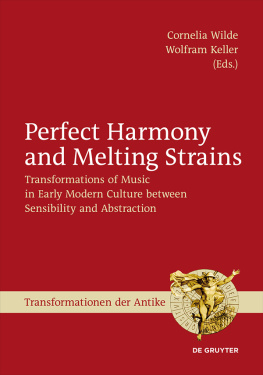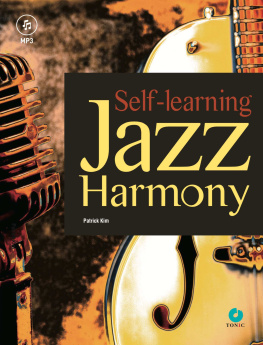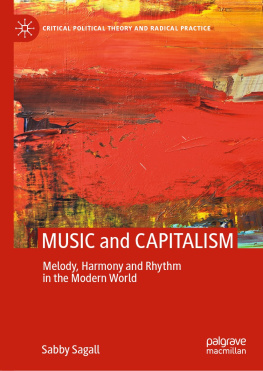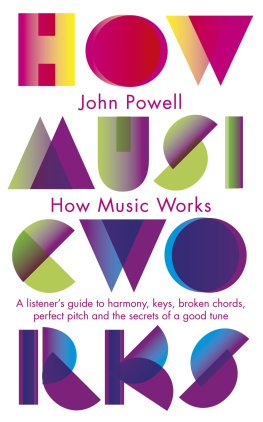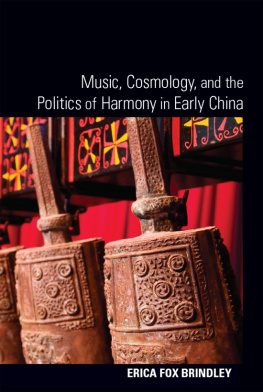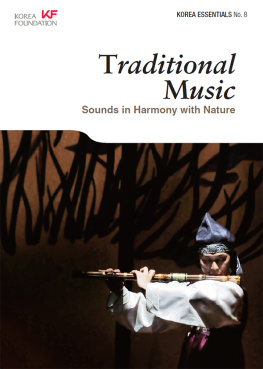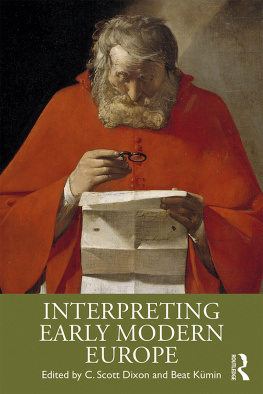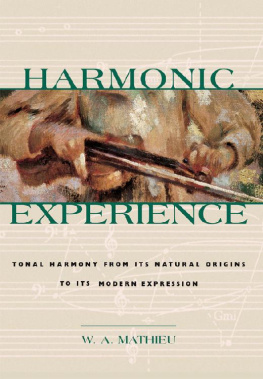Contents
Guide

Perfect Harmony and Melting Strains
Transformationen der Antike
Herausgegeben von
Hartmut Bhme, Horst Bredekamp, Johannes Helmrath,
Christoph Markschies, Ernst Osterkamp, Dominik Perler,
Ulrich Schmitzer
Wissenschaftlicher Beirat:
Frank Fehrenbach, Niklaus Largier, Martin Mulsow,
Wolfgang Pro, Ernst A. Schmidt, Jrgen Paul Schwindt
Band 34
De Gruyter
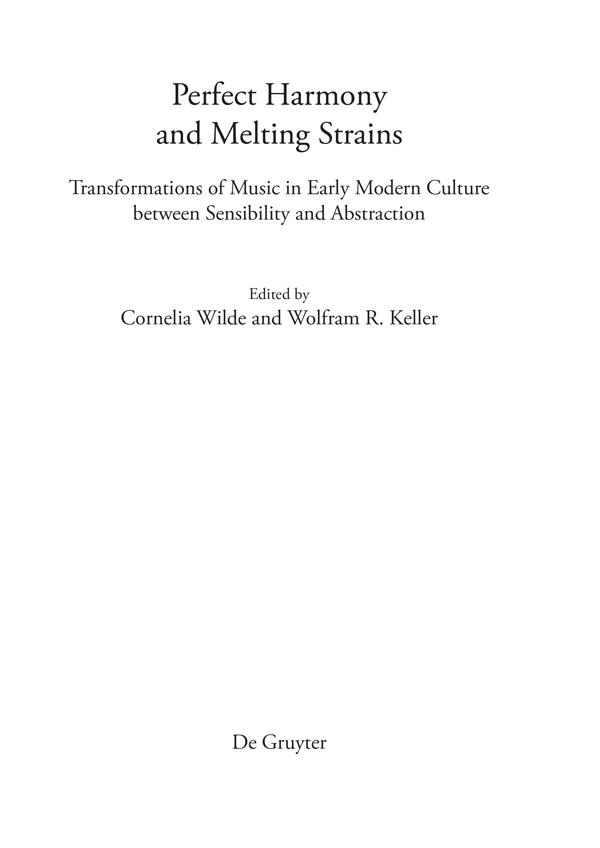
The publication of this volume was made possible through the support of the
Deutsche Forschungsgemeinschaft, using funds provided to
Collaborative Research Center 644 Transformations of Antiquity.
ISBN 978-3-11-042637-3
e-ISBN (PDF) 978-3-11-042206-1
e-ISBN (EPUB) 978-3-11-042213-9
ISSN 1864-5208
Library of Congress Control Number: 2021931474
Bibliographic information published by the Deutsche Nationalbibliothek
The Deutsche Nationalbibliothek lists this publication in the Deutsche Nationalbibliografie;
detailed bibliographic data are available on the Internet at http://dnb.dnb.de.
2021 Walter de Gruyter GmbH, Berlin/Boston
Cover illustration: Martin Zech, Bremen
Logo Transformationen der Antike: Karsten Asshauer SEQUENZ
Printing and binding: CPI books GmbH, Leck
www.degruyter.com
Introduction:
Perfect Harmony and Melting Strains:
Transformations of Music in Early Modern Culture
Between Sensibility and Abstraction
C ORNELIA W ILDE AND W OLFRAM R. K ELLER
In early modern culture, philosophers, musicians, theologians, and poets were fascinated by and grappled with the ambivalent nature of music. Music was perceived as a phenomenon occupying an ambiguous position between mathematical abstraction and sensual experience. In the Pythagorean-Platonic tradition, music was understood as euphonic mathematics, replicating the perfection and beauty of a transcendent cosmic order. With a view to perfect harmony, the cosmos was conceived as a unity of perfectly constructed proportionsfrom the heavens via humans to musical intervals. Contrarily, yet simultaneously, music was perceived of as having eminently problematic sensuous-erotic powers speaking to the baser bodily nature of humans. This volumes title Perfect Harmony and Melting Strains tries to capture the range of these ambiguous and ambivalent conceptions and cultural valuations of music in early modern religious, philosophical, literary, and medical discourses. The chiastic structure of title and subtitle stresses the complex connections of these seemingly antagonistic conceptualizations of music that this volume seeks to explore.
The ancient Pythagorean-Platonic notion of harmony as a cosmological principle expressed in musico-mathematical terms is omnipresent in the early modern period and already permeates, often in association with angelic song, the Middle Ages, with Boethius and Saint Augustine among the foremost late-ancient authorities. While Boethius comprehensively studied the harmonic proportions of body and soul ( musica humana ) and the consonance of the spheres ( musica mundana ), instrumental music ( musica instrumentalis ) playedat besta negligible role. Instrumentalists are discussedalong with the poetsas having little to no understanding of the rational order that underlies musical practice. Musicians merely acted upon their musical instincts, as Boethius puts it.
To bring these tensionsbetween metaphysics and materialism, ars and usus , musical abstraction and musical affectand the emerging hybridities comprehensively into view, this volume approaches the resilience and longevity of these seemingly antagonistic traditions and perspectives on music from an interdisciplinary perspective. Musicologists, historians of science and philosophy as well as literary scholars have contributed to this volume in order to investigate the transformations of musics scientific, theological, and literary and cultural discursive functions through a dense score of closely connected themes and texts. The contributions to this volume discuss texts ranging from Geoffrey Chaucers late fourteenth-century Parliament of Fowls via Marsilio Ficinos fifteenth-century Commentary on Platos Timaios and Francis Bacons sixteenth-century Sylva Sylvarum (1626) to Joseph Addisons two Cecilian odes penned towards the end of the seventeenth century.
In all of these philosophical, theological, medical, and literary texts, ancient concepts and traditions of musical theory and practice are referencedfirst and foremost, albeit not exclusively the Pythagorean-Platonic notion of perfect harmony. One of our volumes chief interests concerns the way in which musical theorems were modified, more precisely, the ways in which several discursive fields filtered and recalibrated, re-discovered and re-read ancient Greek and (medieval) Latin texts. What specific ends did the explicit references to ancient authorities, to ancient theoretical and practical musical knowledge serve within these respective fields? Which ancient classicalor othermodels for musico-poetical and meta-poetic practices were utilized in the self-staging, authorizing, and othering of medieval and early modern artists, scholars, sovereigns, and Christians? Barbara Swanson shows in her paper on plain chant how the Italian chant editor Giovanni Guidetti constructed a liturgical musical tradition from Pythagoras through Hebrew practice to his sixteenth-century present in order to argue for musical ritual in church. By presenting this liturgical musical practice as part of an ancient Judeo-Christian tradition, Guidetti claimed Catholicisms authenticity and authority against Protestant reformers.
Mainly through Boethius and Saint Augustine, as we have seen, the Pythagorean-Platonic numerological-proportional theories of music along with the concomitant idea of cosmic and angelic harmonies were integral parts of medieval and early modern knowledge. References to and transformations of the concept of the harmony of the spheres are omnipresent in medieval and early modern musicological, theological, medical, as well as cosmological and astrological discourses and reoccur repeatedly as tropes in literary and poetic texts. As Wolfram R. Keller shows, Chaucers dream visions frequently include explicit references to the music of the spheres or use numerological means to represent musica mundana . At the same time, however, poems like the Parliament of Fowls also subtly subvert such harmonies, testing noise and dissonancerather than pleasing harmoniesas alternative models for making vernacular poetry. Jacomien Prins analyses in her contribution the scholarly debate between Marin Mersenne and Francesco Patrizi with one of the Renaissance authorities regarding the Pythagorean-Platonic traditionMarsilio Ficino. Likewise, Penelope Gouks survey of English theories on the powers and effects of music illustrates that Enlightenment scholars, such as Richard Brocklesby, still referenced and discussed notions of universal harmony in the context of musical healing in the middle of the eighteenth century.
The interest in classically-derived musica speculativa with its central theme of perfect harmony shifted in the early modern periodas has been arguedchallenging or deconstructing perfect harmonys all-pervasive power.
In her contribution to this volumedealing with the relation between the metaphysics of harmony and the physics of soundJacomien Prins argues that Franceso Patrizi and especially Marin Mersenne criticized Marsilio Ficinos Neopythagorean-Neoplatonic notion of universal harmony and tried to sever the connections between world harmony and musical harmony, the connection between musica mundana , humana , and instrumentalis . While Mersenne dismissed numerology, astrology, and the belief in occult powers in Ficinios concept and aimed at a new empirical attitude of observation, Prins shows that Mersenne did not leave the metaphysical basis of Ficinos concept behind. Thus, Prins investigates a form of transformation in which scholars could not yet escape the charm of their object. At the same time, her article highlights how early modern thinkers interacted and debated: While Mersenne aimed at distancing himself from Ficinos magical agenda, in the even more pressing debate with his contemporary Robert Fludd, Mersenne used Ficino as an alley in his polemics against Fludd.

